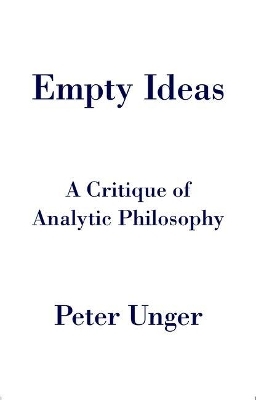
Empty Ideas
Oxford University Press Inc (Verlag)
978-0-19-069601-6 (ISBN)
In the mid-twentieth century, philosophers generally agreed that, by contrast with science, philosophy should offer no substantial thoughts about the general nature of concrete reality. Leading philosophers were concerned with little more than the semantics of ordinary words. For example: Our word "perceives" differs from our word "believes" in that the first word is used more strictly than the second. While someone may be correct in saying "I believe there's a table before me" whether or not there is a table before her, she will be correct in saying "I perceive there's a table before me" only if there is a table there. Though just a parochial idea, whether or not it is correct does make a difference to how things are with concrete reality. In Unger's terms, it is a concretely substantial idea. Alongside each such parochial substantial idea, there is an analytic or conceptual thought, as with the thought that someone may believe there is a table before her whether or not there is one, but she will perceive there is a table before her only if there is a table there. Empty of import as to how things are with concrete reality, those thoughts are what Unger calls concretely empty ideas.
It is widely assumed that, since about 1970, things had changed thanks to the advent of such thoughts as the content externalism championed by Hilary Putnam and Donald Davidson, various essentialist thoughts offered by Saul Kripke, and so on. Against that assumption, Unger argues that, with hardly any exceptions aside from David Lewis's theory of a plurality of concrete worlds, all of these recent offerings are concretely empty ideas. Except when offering parochial ideas, Peter Unger maintains that mainstream philosophy still offers hardly anything beyond concretely empty ideas.
Peter Unger is a Professor of Philosophy at New York University. He is the author of five previous self-standing books, all currently available from the Oxford University Press: Ignorance: A Case for Scepticism; Philosophical Relativity; Identity, Consciousness and Value; Living High and Letting Die: Our Illusion of Innocence; and All the Power in the World. As well, Oxford has published his Philosophical Papers, a two-volume collection of shorter works previously published elsewhere.
1. How Empty is Mainstream Philosophy?
2. Promising Examples of Concretely Substantial Philosophy
3. Thinkers and What They Can Think About: Empty Issues and Individualistic Powers
4. The Origins of Material Individuals: Empty Issues and Sequentialistic Powers
5. The Persistence of Material Individuals: Empty Issues and Self-Directed Propensity
6. Empty Debates About Material Matters
7. Individuals, Properties and Time: A Few Substantial Thoughts and Many Empty Ideas
8. What Will Become of Us: Empty Issues and Substantial Speculations
9. When Will There Be Some Serious New Substantial Philosophy?
| Erscheinungsdatum | 11.11.2017 |
|---|---|
| Verlagsort | New York |
| Sprache | englisch |
| Maße | 152 x 231 mm |
| Gewicht | 399 g |
| Themenwelt | Geisteswissenschaften ► Philosophie ► Erkenntnistheorie / Wissenschaftstheorie |
| Geisteswissenschaften ► Philosophie ► Metaphysik / Ontologie | |
| Geisteswissenschaften ► Philosophie ► Philosophie der Neuzeit | |
| ISBN-10 | 0-19-069601-X / 019069601X |
| ISBN-13 | 978-0-19-069601-6 / 9780190696016 |
| Zustand | Neuware |
| Haben Sie eine Frage zum Produkt? |
aus dem Bereich

![Was heißt Denken?. Vorlesung Wintersemester 1951/52. [Was bedeutet das alles?] - Martin Heidegger](/media/113619842)
